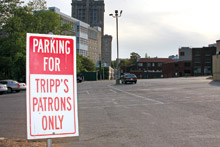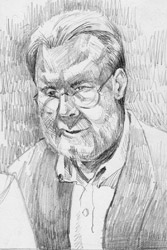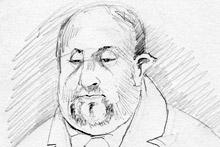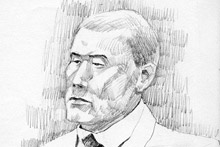The federal corruption trial of former Buncombe County Sheriff Bobby Medford continued this week with the prosecution bringing out an array of confessed illegal-gambling operators, who testified that they’d bribed Medford or his deputies—including former reserve Capt. Guy Penland, who’s also on trial—in return for protection and favors.

The government finished its case with video and audio evidence, alleging that the conspiracy surrounding illegal video-poker machines extended beyond Buncombe County, involving Haywood County Sheriff Tom Alexander (who’s been subpoenaed by a grand jury) and a former Rutherford County sheriff.
In beginning their defense of Medford, attorneys Stephen Lindsay and Victoria Jayne called four former Medford employees to the stand, including current Buncombe County Sheriff Van Duncan.
Day 5: Monday, May 5
Jerry Pennington, a salesman for Henderson Amusement, told jurors he’d given Medford envelopes filled with cash. Pennington and the business’s owners have confessed to running an illegal-gambling operation and bribing public officials.
After a meeting in Medford’s car in the parking lot of Tripp’s Restaurant in downtown Asheville, said Pennington, he’d been informed “that I needed to deal directly with him from now on,” instead of giving bribes for Medford to former reserve Capt. Guy Penland (who’s also on trial). Pausing occasionally to ask for more water as his voice cracked, Pennington said he would drop by Medford’s office every few months to hand over sealed envelopes containing $2,000 to $3,000 in cash. He even gave Christmas “bonuses” to Medford, Penland and other deputies.
“We’d never talk about money, always about something else,” Pennington said. “I’d just hand the envelope over and he’d put it away.”
The most response he ever got from Medford was a curt “thank you,” Pennington said, but never in a circumstance where it would seem out of place in the rest of the conversation.
“Our business in Buncombe was doing well—we wanted to keep that going,” Pennington said. He said he also paid smaller bribes to Penland and former Lts. Johnny Harrison and Ronnie “Butch” Davis (who have both taken plea deals and testified for the government).
Pennington said he continued giving money to Penland after he’d stopped working as a volunteer at the Sheriff’s Office. “He was like my best friend,” Pennington said of Penland. “He wasn’t getting paid a salary at the department, so we started paying him.”
That pay included $450 a week (plus reimbursement for gas) and $500 for every store owner that Penland persuaded to take the company’s machines. All this allegedly happened at a time when Penland, Harrison and, later, Davis were responsible for registering the county’s video-poker machines.
But Henderson Amusement’s largesse didn’t end there. It also included donations, including $1,000 to the Buncombe County commissioners and $400 for a spot in Clerk of Court Bob Christy‘s golf tournament fundraiser. Pennington said the commissioner donations were “for raffle tickets or something.” He didn’t specify when these donations were made but said that none of them were related to video poker.

Bribes were also paid to Haywood County Sheriff Tom Alexander, Pennington testified: $100 per machine per month, totaling about $3,300. Alexander has not been indicted or charged with any crime at this writing.
Pennington then reviewed financial records for the court that used a code for each payee: “G” or “Judge” for Penland; “J” for Harrison; and a series of the letter “X” for Medford. Medford and Penland were both carefully reviewing the records with their attorneys as Pennington spoke.
Pennington also said that he got favors from the Sheriff’s Office. In one incident, after he’d been pulled over in Henderson County, Penland gave Pennington an honorary deputy’s badge. Later, he said he received honorary sergeant’s and lieutenant’s badges.
“I was told it was OK as long as I didn’t try to arrest anybody, that I could show it if I was pulled over,” Pennington testified. Earlier, prosecutors showed the jury the lieutenant’s badge and honorary-deputy card he’d been given.
In another incident, Pennington said he faced gambling charges in Cleveland County, but managed to get them dismissed in return for community service that he had transferred to Buncombe County—but he never performed it.
“Everything about that community service is deceitful,” he said, referencing documents saying he’d served 77.5 hours of community service (two-and-a-half more than was required) with the Sheriff’s Office senior-reassurance program. In his questioning of Pennington, defense attorney Stephen Lindsay noted that getting those charges dismissed meant that if the witness incurred another gambling charge, the prior one would not weigh against him.
But the favors went both ways, Pennington said. When gas-station owner Imran Alam wanted an 80/20 revenue split on the illegal machines instead of the usual 60/40, Pennington balked, and Alam went looking for another operator’s machines. Even though this violated a rule Medford had previously established to prevent turf wars, Pennington said, the sheriff asked him to let it slide.
“[Medford] asked me to do him a favor and let this one go—to forget about it,” Pennington recalled. “Henderson [Amusement, Pennington’s employer] had a good relationship with [Alam]—so we didn’t want to cause any problems.”

Pennington also testified that Penland had once sold him 100 video-poker registration stickers for $10,000, because many of his machines had been brought in illegally from out of state. But under questioning by Penland’s attorney, Paul Bidwell, Pennington admitted that when Penland was paid to introduce him to store owners who would later install his machines, the then reserve captain had no idea of their illegal origin.
“He thought they were legal,” said Pennington.
Day 6: Tuesday, May 6
A convenience-store owner and video-poker operator, as well as a retired bookie, both testified that they’d bribed Medford to continue their illegal operations.
Alvin Ledford, 84, who peered through thick glasses and is so hard of hearing that both prosecution and defense attorneys had to come directly up to the witness stand to question him, said he’d started paying Medford $2,000 every five to six weeks so he could continue operating his gambling house, which included sports betting and poker games.
“If I wanted to continue to operate, when he asked for money, I had to give it to him,” Ledford told the court. Initially, said Ledford, he gave the money to fellow alleged gambling operator “Papa Jack” O’Leary to deliver to Medford. But later, Ledford said he would accompany O’Leary to meet Medford at the Waffle House on Airport Road, where he’d hand over the cash in an envelope. Waffle House waitress Inez McGinnis testified that she’d seen Medford meet Ledford at the restaurant but had never directly seen money change hands. Ledford was convicted on gambling charges in 1994 and served time in federal prison after being busted by Sheriff Charlie Long, Medford’s predecessor. After Ledford got out of prison, he went back into business, and Medford raided his establishment once, said Ledford.
Ledford also said that one of Medford’s deputies had pushed video-poker machines on him, something he was reluctant to accept. “I didn’t like video-poker machines—they’re highway robbery,” he said. But he ended up taking them toward the end of his career (Ledford retired in 2006) after the deputy told him he’d give back $1,000 in cash Ledford had handed the deputy if he did. Ledford said he never did get the money back.
“He told me I should take the video-poker machines, because they’re legal,” Ledford said with a hoarse chuckle.
Imran Alam, a Pakistani immigrant who ran 17 gas stations and convenience stores, said he had illegal video-poker machines at seven of them and that he twice gave money directly to Medford. Once, in Medford’s office, Alam gave the sheriff $2,000 in a brown paper bag along with a carton of Salem Lights—Medford’s favorite brand, he added. The other time, Alam gave $6,000 to former Lt. Harrison, who then gave half to Medford when the three of them met in the parking lot of the Westgate Shopping Center. Alam pointed out an image, provided by prosecutors, of the check he’d cashed to get the $6,000.
On that occasion, he said, the bribe was paid so that Medford would authorize Alam to switch video-poker companies after a dispute with Henderson Amusement. Alam, who accepted a plea deal from the government, was sentenced last week to 21 months in prison, the loss of three of his convenience stores and $1.67 million in fines.
Alam also routinely wrote checks to Medford’s golf tournaments. One time, when he gave $200, he said reserve Capt. Penland, whom he usually dealt with, grew visibly upset. When Alam said he couldn’t spare more at the time, he said Penland left and he soon received a call from Barron Henderson of Henderson Amusement, who was then supplying Alam’s machines.
“[Henderson] said, ‘Give them what they need—you can’t make them mad,’” Alam recalled.
Alam said that although he’d had video-poker machines a few weeks before he met Penland, it was the reserve captain who “made me feel comfortable” about making illegal cash payouts. Penland also pushed him to put more machines in a particular store than he thought it could physically accommodate, Alam said. He added that they settled on putting one machine in a backroom.
“He said stores all over the county were doing this [paying out cash from the machines],” Alam testified. “He said I could make money as long as I knew people.”
Later that day, Hot Dog King owner Demetre “Jimmy the Greek” Theodossis said he’d paid Medford’s deputies $1,000 a month to protect his illegal video-poker operation.
“They would come around and tell me it was time to make a donation,” Theodossis told the court. “They said it was to help the sheriff—the money was for the sheriff.”
Theodossis said he operated 15 to 20 video-poker machines, mostly in Buncombe. Some were in his four Hot Dog King locations; the rest were in other stores he owned or were rented to stores owned by others. All the machines made illegal cash payouts of up to $5,000, said Theodossis, adding that he split the proceeds, with 50 to 70 percent going to the store owner. Occasionally, when a store owner didn’t have the cash on hand for a large payout, he’d Theodossis would bring the cash in himself.
When government agents raided Theodossis’ home last year, they found $1.7 million in cash, some of it still in the removable “magazines” that hold money paid into video-poker machines. Other amounts were found in such out-of-the-way places as watertight bags in a PVC pipe stashed beside his well.
Theodossis, who’s taken a plea bargain, says he paid the money to former Lts. Harrison and Davis when they ran the video-poker registration program at the Sheriff’s Office. Theodosiss said he’d also make campaign contributions, including $5,000 in cash given to Harrison at one point, with no receipt.
Under questioning from defense attorneys, Theodossis noted that he’d never dealt directly with Medford, except for one time when the sheriff called to thank him for a $500 contribution (given to Davis, in cash, with no receipt) that he’d made for Sen. Elizabeth Dole’s campaign. But Lindsay also asked how Theodossis could be sure he was speaking to Medford, as he didn’t know him. Theodossis replied that he only knew the man had identified himself as Medford.
He also sponsored several teams in Medford’s biannual golf tournaments. Theodossis’ son, Dennis, said that when his father was vacationing in Greece, he received a call from Davis, asking for money. After getting his father’s approval, Dennis testified, he provided it. He also said he’d accompanied his father to one of Medford’s golf tournaments.
When asked if he noticed anything unusual at the tournament, Dennis replied: “Yeah. All the [sponsor] signs up front seemed to be for some sort of amusement company.”
Later, Frank Orr—a longtime acquaintance of Medford and close friend to Davis and Harrison who helped organize the golf tournaments—identified 16 companies related to video poker or gambling on a list of 32 sponsors for one such event. In a good year, said Orr, a tournament could make around $11,500 in profit.
“The golf tournaments were for the sheriff—it was his money, to do with what he wanted to,” Orr testified. “Except on election years. Then all the money had to go to [campaign] headquarters.”
While he said he never saw Medford directly take bribes, he did frequently see Henderson Amusement salesman Jerry Pennington drop by the Sheriff’s Office for closed-door meetings with Medford. Pennington had testified earlier that he routinely gave Medford bribes during such meetings.

Orr also confirmed Pennington’s story that Pennington gave deputies a Christmas “bonus.” “It was five $100 bills in an envelope that said ‘Merry Christmas,’” Orr testified.
Day 7: Wednesday, May 7
Former Capt. Tracy Keith Bridges, who ran the Sheriff’s Office’s Internal Affairs Division and has pleaded guilty to money laundering, said he would take cash given to Medford’s 2006 re-election campaign and turn it into money orders in order to skirt campaign-finance laws. Former Lt. Davis would then provide Bridges with a list of names, he testified, that would be falsely placed on the money orders.
During a meeting with Medford, said Bridges, he and Sharon Stewart (the sheriff’s office manager and former personal secretary), heard Medford’s campaign chair, David Brown, express concerns about these practices. The sheriff, said Bridges, rebuked him and told him to stop the practice.
“I got the feeling he was putting on a show,” Bridges told the courtroom. After Brown had left the office, continued Bridges, Medford said, “F**k him. We’ll keep doing what we’re doing.”
Bridges also testified that Medford would occasionally ask for cash—usually in increments of $1,000, $700 or $500—from the money that was being converted into money orders, some of which came from illegal video-poker operators. Medford, said Bridges, warned him not to tell Davis.
Bridges added that although he knew what he was doing was illegal, he was afraid. “I was scared for my job,” Bridges told the court. “I wanted to keep being employed there.”
The prosecution also played tape recordings Bridges had made in the final weeks of Medford’s tenure, when the deputy had begun cooperating with the government. In one, Davis can be heard saying, “There’s no paper trail to him.” Bridges testified that “him” referred to Medford.
Another time, said Bridges, the sheriff had him deposit $500 cash in the account of Judi Bell, Medford’s girlfriend. Prosecutors presented bank records showing the deposit the same day, along with a check for the same amount to Harrah’s Cherokee Casino, as part of their case that Medford used much of the money obtained from bribes to fund his legal gambling habit (he reportedly lost more than $50,000 gambling in 2006 alone).
Jenny Watts, who works at Premier Federal Credit Union, had previously testified that between 2002 and 2006, the couple had collective cash deposits of $113,694 more than their salaries. Defense attorney Lindsay noted that Medford had access to other sources of money, such as loans, a credit card or other banks. Watts said that Medford would occasionally take out loans ranging from a few hundred dollars to $4,000.
Earlier that morning, Charles McBennett, who has confessed to operating 30 video-poker machines in the county—all of which made illegal cash payouts—said he’d bribed Medford on two occasions.
Once, just before Medford underwent back surgery, McBennett said that former Lt. Johnny Harrison (who has taken a plea deal) brought McBennett to the sheriff’s office, where McBennett gave Medford a small cross that said “God watches over you,” along with $5,000 in cash.
The bribe, McBennett said, was in exchange for information about his competitors so that he could get dissatisfied store owners to switch to his company. In an effort to prevent turf wars, Medford usually didn’t allow such changes.
McBennett said that former reserve Capt. Penland even gave him the name of one operator particularly disliked by the sheriff and encouraged him to move in on the other man’s territory.
Another time, McBennett testified, he and Harrison made a trip to Medford’s Weaverville apartment shortly after the sheriff’s surgery. That time, too, he brought along $5,000, but Harrison ended up with $2,000 of it.
“[Harrison] said, ‘Don’t give him all that,’” McBennett recalled.
During the afternoon, the prosecution successfully entered a video recording as evidence, over the defense’s objections. In the video, the prosecution said, current Rutherford County Sheriff Jack Conners and former Rutherford County Deputy John Parker meet with Jamie Henderson of Henderson Amusement and Jeff Childers, a salesman for Henderson in the Rutherford area.
At the time, Parker and Conners were assisting the FBI in investigating illegal gambling, and the meeting was part of a sting operation.
The video, which jurors were to see the next day, depicts Henderson and Childers giving money to Conners and reassuring him that other sheriffs in the region were also involved. Although Medford had lost his re-election bid by the time the video was recorded in December 2006, he is mentioned as one of the recipients of Henderson Amusement bribes.
The defense argued that the video involves a different criminal conspiracy than the one allegedly involving Medford—and was thus inadmissible. The prosecution shot back that Henderson’s conspiracy reached across the whole region and that Medford’s piece of it, while the focus of this trial, was not separate from the larger operation.
Judge Ellis found the prosecution’s argument convincing. “The law clearly shows that a participant in a conspiracy doesn’t have to be aware of the full extent of it ,” he said.
U.S. Attorney Gretchen Shappert (whose district includes the Charlotte area), the supervisor of Assistant U.S. Attorney Edwards, briefly stopped by to watch the proceedings. Medford, meanwhile, pored over the evidence presented, while occasionally leaning over to whisper to defense attorney Victoria Jayne.
Day 8: Thursday, May 8
The prosecution’s last witness was Jim Lindsey, 77, who testified that he owns Mountain Music & Amusement, which has operated jukeboxes, pool tables and video poker machines since the mid 1980s. He said he turned his business over to his two sons but got involved again after they had trouble.
Lindsey said he contributed money to Medford’s golf tournaments in 2005 and 2006. Under questioning from assistant U.S. Attorney Corey Ellis, Lindsey said he thought he was contributing to Medford’s re-election and helping one of his sons with the video-poker business. Lindsey said the machines were operated illegally by offering cash payouts.
Ellis: “Did you have concerns about enforcement action against them?”
Lindsey: “Yes.”
Ellis: “Did that encourage you to pay?”
Lindsey: “Yes.”
Lindsey testified that he had a conversation with former Lt. Harrison, who said he was preparing to retire from the Sheriff’s Office but wanted to help Lindsey’s son get video-poker machines in locations owned by Imran Alam. “He said you’re going to have to give him [Medford] some money. He said five or six [thousand].”
Lindsey said he collected $2,000 on two different times and delivered the cash to Medford. The third time, he said, he met Medford in the parking lot of Groce United Methodist Church and handed the sheriff $2,000 in cash.
Lindsey also testified that he gave Medford $1,500 to pay for a personal vacation. “He called me and told me he was going to take his grandchildren on vacation, and he asked if I had any money he could borrow.” Lindsey said he told Medford he had $1,500, which Medford came by and picked up.
“I said, ‘Bobby, least you could do was leave me some money for lunch.’ But I was just joking with him,” Lindsey said.
Defense attorneys began their case by calling four of his ex-employees to the stand.
First up was current Buncombe County Sheriff Van Duncan, who once worked as a deputy under Medford. Duncan testified that in October 2006, about a month before the election, Deputy Bridges approached him in a Starbucks coffee shop, identifying himself as the treasurer of Medford’s re-election campaign. Bridges testified earlier that he would take cash and use it to purchase money orders in an effort to dodge campaign-finance laws.
Duncan said he told Bridges that “if he felt he was in trouble, he needed to go speak with the FBI.” Duncan said he told an FBI agent—a former colleague from the Sheriff’s Office—about his conversation with Bridges.
The next defense witness was Julie Keppel, the staff attorney for the Sheriff’s Office from 2002 through 2006. Keppel is now a Buncombe County assistant district attorney under Ron Moore.
In December 2003, said Keppel, she responded to a local newspaper’s public-records request to see the registration records for video-poker machines. Keppel said she talked with former Lt. Harrison and former reserve Capt. Penland, who oversaw the registrations, and discovered that “the records weren’t kept very well.”
Keppel said Penland and Harrison contacted the machine operators in the county and asked for updated paperwork on the number of machines they had and where they were located, and that she shared those records with the newspaper. Keppel said she also drafted a letter for Medford to sign that asked video-poker-machine owners to supply annual reports on the number of machines they owned and where they were located.
The next defense witness, Jerry Wayne Miller, told the court that he went to work for Medford in October 2004 after working for 24 years as both a U.S. attorney and assistant U.S. attorney in Asheville’s federal court. Miller said he was assigned the rank of major and reported directly to Medford.
Miller said that in the late fall or early summer of 2005, a “close friend” involved in Democratic politics had told him of allegations concerning Medford that included the illegal operation of video-poker machines in Buncombe County and bribes paid to law enforcement. “He said he didn’t want me near when the bomb went off, ” Miller said. “He was basically giving me a heads up.”
Miller said he told Medford about the conversation and that Medford “blew up.” Miller said he researched how Medford could force the removal of the machines from Buncombe County. There wasn’t any follow-up on that research, Miller said.
Miller, a lifelong registered Democrat, testified that he changed his party affiliation to Republican after Medford told him that health concerns might force him to step down from his position if he won re-election, and that he wanted Miller to be able to take over until the local Republican Party could name a successor.
The last defense witness of the morning was former Medford secretary Rhonda House. House said she never saw anyone hand Medford envelopes of cash and that she never knew about the meetings between Medford and video-poker-machine owners and operators that prosecution witnesses had testified about.
At the end of the day, Judge Ellis heard arguments from both sides about the evidence in the case and ruled that ample evidence had been presented for a jury to make a decision.
For daily updates on the Medford trial, go to www.mountainx.com/mxadmin.
Update (April 19, 2023): Imran Alam’s 21-month sentence was reduced to time served on Oct. 8, 2008, on account of his role as a cooperating witness. He worked as an FBI informant from 2006-09.



Before you comment
The comments section is here to provide a platform for civil dialogue on the issues we face together as a local community. Xpress is committed to offering this platform for all voices, but when the tone of the discussion gets nasty or strays off topic, we believe many people choose not to participate. Xpress editors are determined to moderate comments to ensure a constructive interchange is maintained. All comments judged not to be in keeping with the spirit of civil discourse will be removed and repeat violators will be banned. See here for our terms of service. Thank you for being part of this effort to promote respectful discussion.